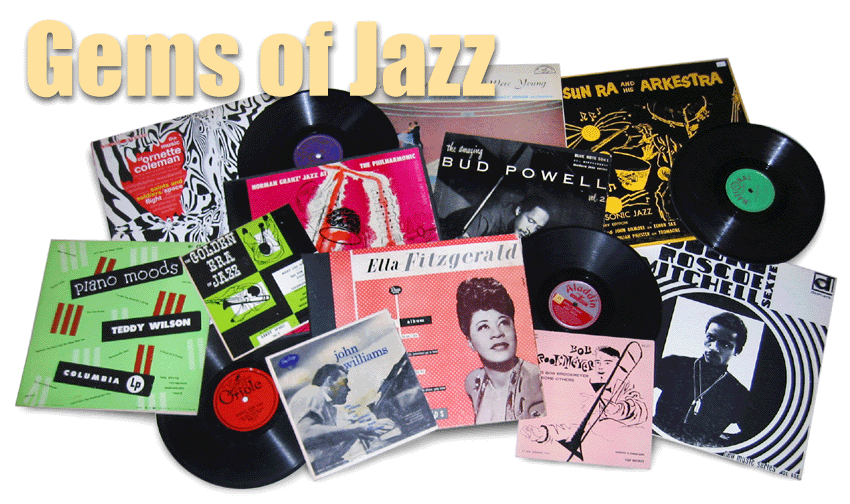Hazel Scott was one of a number of talented female jazz pianists who had successful solo careers beginning in the '40s – Hadda Brooks, Dorothy Donegan and Rose Murphy being a few of the others. For some reason, they all specialized in jazzing up classical pieces – Hazel especially. No doubt the routine had a novelty appeal and brought in the crowds, but it is odd that so many talented players, all women, resorted to that approach. I wonder what Liszt would have thought of one of his rhapsodies set to an eight-to-the-bar boogie beat?
Hazel Scott was perhaps best known late in life as Rep. Adam Clayton Powell's wife, but she deserves to be remembered for her talent as a pianist of exceptional skill. She began her professional career in 1940 when she created a stir at the opening of Barney Josephson's Cafe Society Uptown. She went on to appear in shows on Broadway, perform at Carnegie Hall and record for several prominent record labels. Born in Trinidad in 1921, Scott had been educated as a classical pianist at Julliard but soon after graduating found opportunities for black performers limited – the old story. So it was as a jazz artist that she found acceptance, taking inspiration from Teddy Wilson and Art Tatum. An extremely attractive woman with an excellent singing voice, she made a number of movies and was the first woman of color to have her own TV show (though it ran only a few months in 1950).
Hazel Scott was perhaps best known late in life as Rep. Adam Clayton Powell's wife, but she deserves to be remembered for her talent as a pianist of exceptional skill. She began her professional career in 1940 when she created a stir at the opening of Barney Josephson's Cafe Society Uptown. She went on to appear in shows on Broadway, perform at Carnegie Hall and record for several prominent record labels. Born in Trinidad in 1921, Scott had been educated as a classical pianist at Julliard but soon after graduating found opportunities for black performers limited – the old story. So it was as a jazz artist that she found acceptance, taking inspiration from Teddy Wilson and Art Tatum. An extremely attractive woman with an excellent singing voice, she made a number of movies and was the first woman of color to have her own TV show (though it ran only a few months in 1950).
The two albums offered here have, to my knowledge, never been reissued in any form other than these original 78s. I can't remember where I found them – most likely at a yardsale or second-hand store somewhere. The music is pretty routine though quite accomplished – not nearly as bad as Mike Levin's contemporary review from Downbeat magazine would have you believe (upper left). Needless to say, I was delighted to come across them because Hazel Scott's music is extremely hard to find. They consist of a Signature album done in 1946 and a Decca set from 1940 (one of Hazel's first sessions). You'll note that the Signature group consists of nine sides rather than the usual eight – that's because the last two tunes (Scott originals) were grouped togther on a single side.
As always, the music in this posting was ripped from the original recordings. As the sources here are 78-rpm discs, surface noise has been cleaned up in additon to the usual mild cleaning up of minor clicks and pops. These records are nearly 70 years old, so be forewarned that the sound is not perfect.

Hazel Scott, piano
New York, NY; Spring 1946; Signature Album S-1
1. A Rainy Night in G (Scott)
2. How High the Moon
3. I Guess I’ll Have to Change My Plans
4. Valse in C-Sharp Minor (Chopin)
5. Noctourne in B-Flat Minor (Chopin)
6. Fantasie Impromptu (Chopin)
7. Sonata in C Minor (Scarlotti)
8. Tocatta (Scott)
9. Idyll (Scott)
Hazel Scott, p; J.C. Heard, d.
New York, NY; December 11, 1940; Decca Album 212
10. Prelude in C-Sharp Minor (Rachmaninoff)
11. Country Gardens (Grainger)
12. Hungarian Rhapsody (Liszt)
13. Valse in D-Flat Major (Minute Waltz) (Chopin)
14. Ritual Fire Dance (de Falla)
15. Two Part Invention (Bach)
11. Country Gardens (Grainger)
12. Hungarian Rhapsody (Liszt)
13. Valse in D-Flat Major (Minute Waltz) (Chopin)
14. Ritual Fire Dance (de Falla)
15. Two Part Invention (Bach)





Really nice! Thanks!
ReplyDeletemuchas gracias !
ReplyDelete